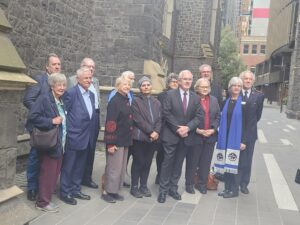
Jenan Taylor
5 September 2024
Sudanese communities in Australia have expressed confusion and despair at Australia’s response to the crisis raging in Sudan.
Many members of the Sudanese diaspora felt abandoned because of a lack of public awareness of the scale of the horror.
It comes as Australia’s humanitarian agencies sent an open letter to the federal government in September urging it to increase its efforts and take more decisive action to address the urgency of the crisis.
The agencies also noted the government’s “disturbingly quiet” response to a declaration of famine in the Darfur region, in the letter.
St Peter’s Jieeng Congregation Hoppers Crossing member James Mayen said many Sudanese and South Sudanese diaspora were devastated by what was unfolding in Sudan.
He said they grieved the loss of relatives and friends there and the hardships facing many who managed to survive so far.
Mr Mayen said their loved ones in Sudan and many in refuge in South Sudan, depended on the diaspora for aid, and this as well as the escalating war, was traumatising to all parties.
He said the Sudanese diaspora, like many other immigrant communities, felt they contributed to Australia and hoped it would respond better to their concerns about a humanitarian crisis in their birth country.
Read more: More refugees, more hunger: What we missed in 2023
He said it was bewildering that the government focussed more support on Ukraine, and parts of the Middle East, than on African nations like Sudan and South Sudan.
“You feel hopeless. Humanitarian-wise, Australia has a power to do many things, so where is its voice to put pressure on the warring parties? Why are they are not helping in that situation,” Mr Mayem said.
“The government contributes to the United Nations but you don’t see what they are doing and sometimes this just doesn’t feel right. You wonder why Australia pays less attention to most of the African countries.”
He encouraged Australians from all religious communities to pray for those affected by the conflict, and that humanitarian services would reach those displaced by it.
The bloodied combat started when hostilities between two armed groups boiled over in April 2023.
Human Rights monitors report that almost 25 million people are now in dire need in Sudan, and it has become the largest displacement crisis in the world.
The African Australian Advocacy Centre said local Sudanese communities needed to be shown Australia had a humanitarian heart, because their loved ones were caught in a humanitarian catastrophe.
Chairman Noel Zihabamwe said a lack of recognition of the scale of the horror in Australia created a deep sense of abandonment for many people in the Sudanese diaspora.
Mr Zihabamwe said media, diplomatic and humanitarian efforts combined could better support them and make a difference in Sudan.
Read more: In democracy, we express Jesus’ words of love for neighbour
He said the Sudanese Australian community struggled to get their perspectives and needs understood because mainstream media interest and coverage of African issues were mostly deficient.
Mr Zihabamwe said community leaders were trying to raise more awareness of the devastation through social media initiatives and other drives, but it was very hard without media attention.
He said Australians could help by spreading the word to friends and neighbours and by talking to local politicians and community organisations.
Mr Zihabamwe said at a political level he wanted the Australian government to work with the Sudanese community to understand what was happening, and come up with solutions through collective action.
He also said the government needed to invest as much interest in Africa’s humanitarian sector as it did in the continent’s mining and business sectors.
Mr Zihabamwe was responding to news the foreign affairs and trade assistant minister Tim Watts would attend an African-focused mining conference in Perth this week.
Minister Watts said in his announcement about the conference that Australia’s engagement with Africa had never been more important.
Mr Zihabamwe said it was good the minister was interested in improving Australia’s relationship with Africa, but he hoped he would become involved in similar meetings focussed on the humanitarian crisis there.
The Australian Council for International Development said there was an international humanitarian pledging conference for Sudan and neighbouring countries held in Paris in April.
Humanitarian advisor Naomi Brooks said ACFID was disappointed Australia had sent no ministerial representatives to the conference.
A spokesperson for the Department of Foreign Affairs and Trade said the Australian government remained concerned about the deteriorating situation in Sudan and the region, including the prevalence of famine conditions.
The spokesperson said the government was raising its concerns about the conflict publicly, bilaterally, in multilateral fora and with international partners.
They said the government met regularly with African diaspora groups, including members of the Sudanese community in Australia and that minister Watts had visited six African countries, and engaged with African officials, academics and community and business leaders both in Australia and Africa.
To donate to Sudan appeals see here and here.
To call for more Australian government action to the crisis, see here.
This article was updated on 10 September to include a response from the Department of Foreign Affairs and Trade’s concerns about the deteriorating situation in Sudan.
For more faith news, follow The Melbourne Anglican on Facebook, Instagram, or subscribe to our weekly emails.







